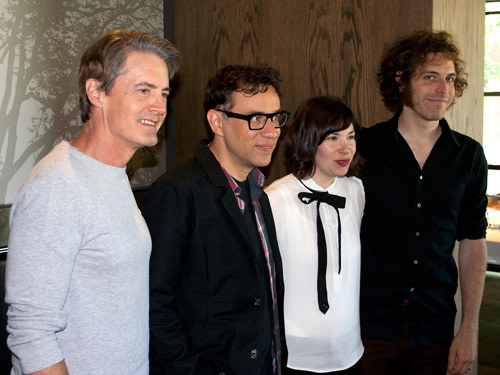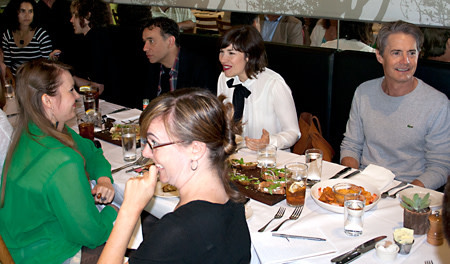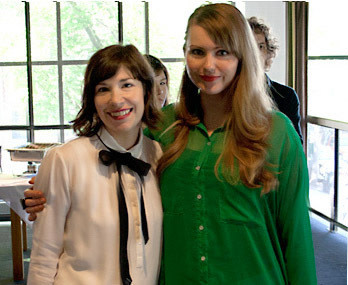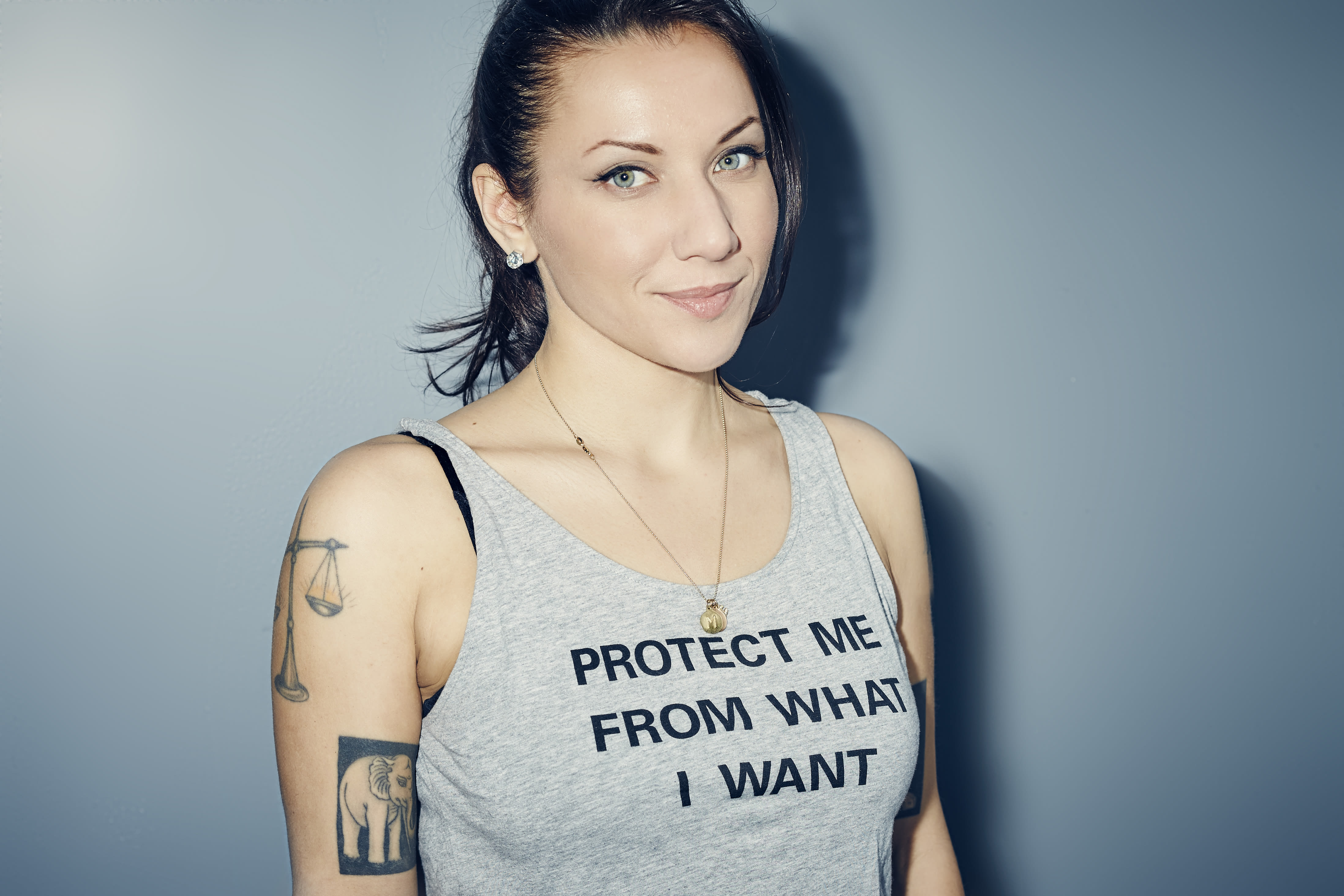Interview with Portlandia's Carrie Brownstein

Guest star Kyle MacLachlan (the Mayor); creators and stars Fred Armisen and Carrie Brownstein; co-creator, director and co-writer, Jonathan Krisel
Yesterday, the fine folks at Portlandia offered a little preview of Season 3 for Shop Talk, Culturephile, and a couple other local media outlets. We got to go on set in a house in Northwest and watch Carrie and Fred film a couple scenes with Chloë Sevigny, as well as a quick teaser video of Season 3 scenes. Then they swore us to secrecy that we wouldn’t say anything about what happened (like describing Carrie’s hilarious costume malfunction or the prop du jour: the Polaroid Land Camera—one has to wonder if it's making a national comeback, or just in Portland courtesy of Thomas Lauderdale's love and eBay habit). Stupid, right?
But we did get to chat with Carrie over lunch about something we’ve wondered a long time: what does the rest of the world think about Portlandia? And we managed to get a little info about Season 3 we can share, like how they’re changing tack some. For your sake, we cut out the small talk about her favorite shows (Homeland, Girls).
Shop Talk: Did you get picked up for more episodes this Season?
We didn't want more. We’re doing 11—ten plus a winter special. To me, less is more. You get a tightly curated narrative. I feel like most shows on HBO have just 13 episodes. Homeland, did you watch Homeland? About the CIA antiterrorist unit with Claire Danes. I just only want to talk about other people's shows.
Culturephile: You all were just filming near my house on Mississippi. There was a food cart called Stu's Stews.
That takes place in our winter episode. The funny thing about doing that is we have such a great art department, and it's across from the real food carts [at Prost], and people were going up to get food.
Culturephile: Were they actually serving food? They tried to sell to me as I was walking by in the morning.
They were playing it up.

Culturephile: It’s like live performance art. Which is kind of like when you take the show on the road.
I really like the live tour that we did. I was very scared at first, and then it was fine. I'm so used to performing in front of live audiences and getting that sense of immediacy and connection. So that was really the first time that we can have that experience with Portlandia.
Culturephile: Who are the fans? We’re so inside of it here in Portland, what do people think of it elsewhere?
The most surprising thing is how broad the demographic is. One time in LA, the 10 [interstate] was closed, and I was trying to go pick up someone at the airport, and I finally got so frustrated that I drove past a ‘Do Not Enter’ zone because I saw a cop and just needed someone to tell me where the freeway is. And he was like, ‘ah ha, Portlandia!’ And there’s been construction workers in New York. Fred is more known in New York for Portlandia now than for SNL. It sounds cliché, but it's completely heartwarming to realize how broad a TV demographic can get compared to music. You just feel like you're cutting a wider swath in terms of age, ethnicity, and geography.
Culturephile: So it's not all hipsters.
Not at all. I would say the people who take offense to it are hipsters, but not always. It's been interesting and surprising to have a 50-year-old dad with a 15-year-old kid, and they're both into it. The other day I went to the Screen Door and there was a 10-year-old kid who said, “are you on Portlandia? It's a cool show!” It's weird how validating it is to get praise from a 10 year old. I grew up in the Northwest and have lived here and have the same assumption, does this translate and can anybody get it outside of Portland? But I think only Portlanders wonder that.
Culturephile: What are non-Portlanders getting when they watch it? Are they laughing at this thing they don't understand, or seeing a reflection of their own lives?
I think they're seeing themselves. And actually, for the smaller cities, there's this feeling that they've been discovered. Like someone in Tulsa that's living an artisanal, DIY lifestyle, it's a motivating acknowledgement for them. Whereas in Brooklyn or Portland, we’re very self-affirming.
What I find most interesting is there’re these elements of validation for other people. The least common responses is that it's mean-spirited. It's affectionate. I find that if people don't necessarily prescribe to whatever lifestyle we’re portraying, they know someone who does. People have a very personal relationship to the show where they'll recognize themselves or a family member, and they'll forward that skit. A lot of people tell me, “yeah I do this craft stuff, and this person sent me your skit on jewelry.”
Shop Talk: Aaron and I were talking about how people now only refer to Portland as Portlandia.
Culturephile: Like it’s hit it’s tipping point.
As a Portlander, I feel that. I see people on Twitter say, “Portland is not Portlandia.” As a resident, I'm like, “yeah, it's not!” I feel like I'm torn between having pride in the show that I'm doing and also protective of the city I live in. But I don't think there is a conflict of interest.
Culturephile: I just went to the All Songs Considered’s listening party [at Mississippi Studios where Armisen and Brownstein were the local guests]. You and Fred have basically become the unofficial mascots of Portland. It’s like, anytime some sophisticated pop culture show or program comes to town and says, “we need somebody to represent Portland…let’s call Fred and Carrie.” What’s that like?
Shop Talk: Which is even better because Fred doesn't live here.
He's a good guest resident. It's definitely a little surreal. I was at Toro Bravo one night, and I've forgotten during summer there're a lot of tourists here, and somebody walked out of Toro Bravo and looked at me, as if: “of course I'm going to see this person in Portland, because it's part of my Portland tour.” She's like: “oh, Carrie Brownstein, of course!” I almost feel more like a politician; I feel weirdly representational.

Brownstein and Shop Talk's Eden Dawn
Shop Talk: Maybe you guys could jointly run to replace Sam to be mayor.
I think I lost in the first round of the Willamette Week [fantasy mayor] runoffs.
OPB: Was the Peabody a surprise?
That was a total surprise. It was surreal. Because you can't campaign for that. There's not a network that can push you toward something. It just happened. We met the people that vote and nominate for that, and it was a perfect award for Portlandia, because they were nerdy intellectuals at the University of Georgia. We were very flattered, because they do a lot of very serious things. I was crying during the ceremony because they would show some snippet of children who lost their parents in 9/11, or here's the tsunami hitting Japan, and then it was our show and Parks and Rec.
OPB: It’s in Pawnee, Indiana. You are on to something with people being identified in a small city, everybody knows somebody…
I just think there's a curatorial element to Portland in the way that people aspire to live their lives. I always think of the way that we set up our online self. You just shave off everything you don't want and you format all the aspects that you want: this is the homepage I want; these are the pictures I want; and it's very curated. Portland is the embodiment of that highly curated style. I live in a neighborhood where everything is tailored: “well, I know you want your coffee this way.”
I've been all over the states this year and every city has an area that feels like Portland. In Tulsa, there's a little strip of reconstituted warehouse spaces. There's the most esoteric rules in this coffee shop I've ever seen: no sunglasses; speak up. I was taken aback at first, but then I thought, this is adorable.
Culturephile: Are you starting to take material from other cities, or is Portland still providing enough fodder? Do you fear you’re going to run out of weirdness in Portland?
This season we were thinking about: we don't want this to be a concept show where it's just what can we make fun of, because that was never our intention to just spoof or necessarily even satirize, because that's just one joke. We view it as more character-based. We thought, who are the people on the show that the audience love, who are the people we're interested in and how can we further that? I feel like that's the only way you stay with the show. I think of all the shows I like, even if the premise is funny, who exists within that premise, what's the tension, what's the dynamic? This season is more character-based.
OPB: You’ve kind of created a repertory company here with local talent.
We love it. Fred and I want that so bad. We look forward to working with the same people we worked with on Season 1 and 2. If we get more seasons, we'd like to do more stuff that he and I aren't in. Because it's like an album: if you have a band that only plays really fast songs, you stop noticing that the songs are really loud and fast until you put interstitial stuff in there that's like: here's a moment, here’s a pause. You give people a break.
Culturephile: I was listening to your Fresh Air interview with Terry Gross a long time ago when you very proudly said that 90 percent of the cast and crew are local, and she went straight into the skit about the locally raised chicken. You seemed totally surprised, like you walked right into your own little Portlandia caricature. Was that intentional?
No, that is so me. Here I am, wanting her to know how local our show is. It was very much me.
We'll of course let you know the minute we can share some of the details of Season 3. In the meantime, the Portlandia website continues to post previews and behind-the-scenes videos.




